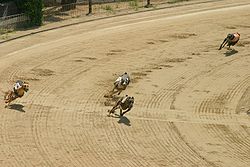Iowa casinos must spend millions to support dog racing

By Paul Brennan | Iowa Watchdog
DES MOINES, Iowa — If a dog at one of Iowa’s two remaining greyhound racetracks was in the same shape as those racetracks’ finances, it would be euthanized on the spot.
Both greyhound racetracks lose millions of dollars each year, only remaining open because state law requires the casinos to which the tracks are attached to maintain greyhound racing.
Last year, the Horseshoe Casino in Council Bluffs spent almost $10 million to cover losses at its Bluffs Run Greyhound Park. The much smaller Mystique, a nonprofit casino in Dubuque, spent more than $4 million last year to keep the dogs running at its racetrack.
Both casinos grew out of the greyhound racetracks they now financially prop up. In 1994, the Iowa Legislature amended state gaming laws to allow casino games at racetracks, which were experiencing a decline in business. The continuation of greyhound racing at both locations was required.
As casinos prospered, the racetracks continued to decline. Betting at the two racetracks has fallen by 97 percent since they first opened in the 1980’s.
GOING TO THE DOGS: Iowa law mandates two of the state’s casino spend millions each year to prop up the state’s money-losing greyhound racetracks.
Bills now before the House and Senate — seemingly stalled at the moment — would drop the greyhound racing requirement for the two casinos in exchange for those businesses paying $70 million over seven years into a fund to assist greyhound breeders and others affected by the end of state-mandated dog racing.
The city councils of both Dubuque and Council Bluffs support dropping the requirement, as do the chambers of commerce of the two cities.
Opposing the change is the Iowa Greyhound Association, which represents breeders, handlers and others involved in greyhound racing. The IGA led successful efforts in 2010 and 2012 to defeat bills that would have dropped the racing mandate.
“Those casinos — which are very valuable properties, worth hundreds of millions of dollars — wouldn’t exist if we hadn’t provided the votes to get them their licenses,” Jerry Crawford, attorney for the IGA, told Iowa Watchdog. “And the agreement was that in exchange for our support, they would support greyhound racing forever.”
But the IGA didn’t support the 1994 change that brought casino games to tracks simply as a gesture of goodwill to casino interests. By that time, the three greyhound racetracks then in Iowa were well in decline.
A year before the law was changed, the Waterloo Greyhound Park filed for bankruptcy. In 1996, it went out of business.
The remaining parks were in better shape, but their best days already were behind them by the time their casinos opened their doors.
According to figures from the Iowa Racing and Gaming Commission, betting at the Council Bluffs track peaked in 1987. Betting in Dubuque reached its peak in 1988.
Asked if greyhound racing would have survived in Iowa without the casinos, Crawford said it was impossible to know, but he did suggest it might have given careful management and proper promotion.
One thing Crawford was clear on is that the $70-million fund the casinos would pay in assistance money doesn’t make the bills before the Legislature more appealing to the IGA.
“Our members would rather work,” Crawford said. “We don’t want to see millions of dollars that could stay in Iowa go to an out-of-state company.”
Crawford was referring to Caesars Entertainment, which operates the casino and dog track in Council Bluffs. The IGA maintains that Caesars will be the ultimate beneficiary if the mandate in dropped.
But at a news conference at the state Capitol last week, civic leaders from Dubuque and Council Bluffs stressed the local benefits that would come from eliminating the mandate.
As a nonprofit casino, the Mystique’s profits are split between Dubuque and local charities and nonprofits. Ending greyhound racing would increase the casino’s profits by millions each year.
In Council Bluffs, city leaders are eager to have the site of the greyhound racetrack, located at a prime spot near Interstate 80, available for redevelopment.
Leaders from both cities said they wanted to eliminate the dog racing mandate so their casinos can compete more effectively in the increasingly crowded gaming market.
“Greyhound racing is the Blockbuster Video of the gaming industry,” Rick Dickinson, president and CEO of the Greater Dubuque Development Corporation, said at the press conference.
Like Blockbuster, greyhound racing is declining “because the industry is changing around them,” Dickinson said. “Customers have voted with their feet.”
In the past decade, more than half the greyhound tracks in the United States have closed. In addition to the two in Iowa, only 19 remain open, and many of them have added other forms of gambling to help keep the doors open.
That the bills to repeal the greyhound racing mandate seem to be stalled in the Legslature doesn’t surprise Dickinson, a former member of the Iowa House of Representatives.
“The other side is very good,” he told Iowa Watchdog. “They have the best lobbyists, make strategic investments with their campaign contributions and leverage their personal relationships with lawmakers.”
If the greyhound racing mandate does survive the legislative session, civic leaders from Dubuque and Council Bluffs say they will continue to push for its repeal.
And last week, they acquired a powerful ally.
At his weekly press conference, Gov. Terry Branstad called greyhound racing a “dying industry” and said he supported closing the racetracks, as long as the people who work in the racing industry were compensated.
Contact Paul Brennan at pbrennan@watchdog.org
The post Iowa casinos must spend millions to support dog racing appeared first on Watchdog.org.







